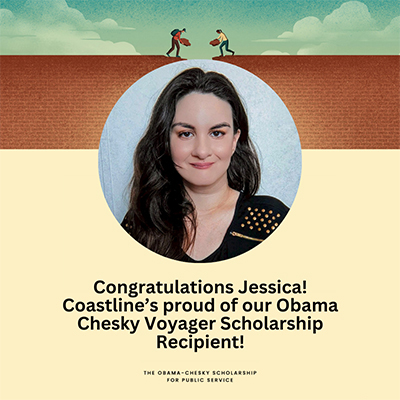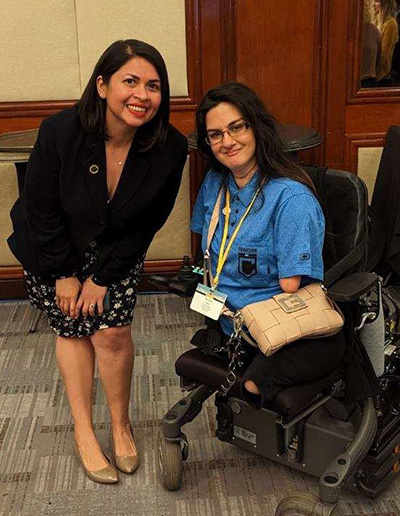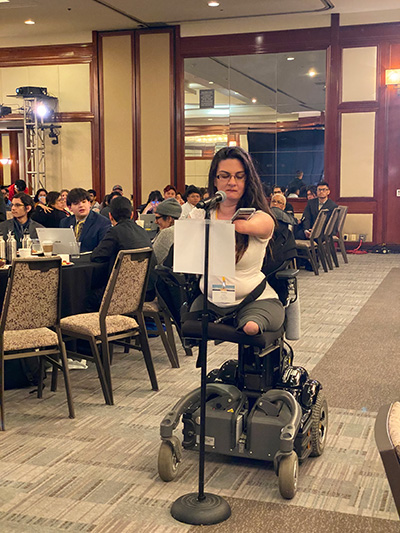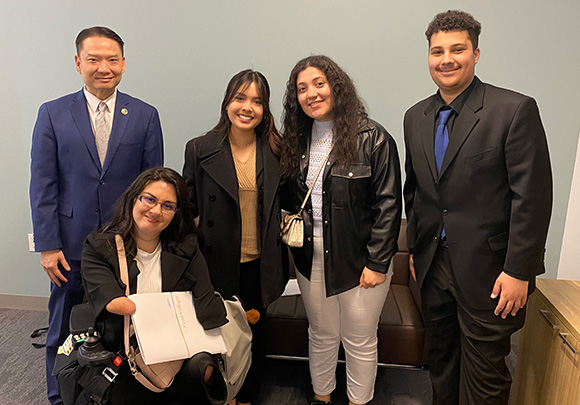“It was like a lightbulb flipped in my head because it made me realize that accessibility is possible, it’s just that institutions have to want to do it, and they have to care about it.”

Jessica Lopez, Obama-Chesky Voyager Scholarship Recipient
Jessica Lopez is undoubtedly a force to be reckoned with. Triple majoring in business, economics, and communications, being the president of Coastline’s Associated Student Government (ASG), and working as a disability advocate sounds like a busy life to lead, and it’s definitely no small feat, but she’s doing it all with grace, and—she notes—the help of her Google calendar.
Her remarkable work in disability advocacy hasn’t gone unnoticed. Most recently, she was awarded the California Association on Postsecondary Education and Disability (CAPED) Student of the Year Award, one of the most prestigious awards given to higher education students within the disability community who have made a significant impact and difference in on-campus life for students with disabilities through involvement or advocacy. Additionally, as she finishes up her second year at Coastline and prepares to transfer to ASU in the spring to get her bachelor’s in business, she is basking in the excitement of being one of the hundred recipients of the Obama-Chesky Voyager Scholarship.
Scholarship Background
Created by former president Barack Obama and Airbnb Co-founder and CEO Brian Chesky, the Voyager scholarship provides students with the means and valuable experiences to support them in pursuing a career of their choosing in the public service sector.
The scholarship will help Jessica have a fresh start, she says. Without the burden of student loans when she graduates, it will allow her the financial freedom to pursue the public service career she wants, which can be anything from making speeches to working with organizations on trainings. She’ll also be provided with the opportunities, connections, and experiences she needs to support her public service vision of improving disability inclusion and rights within the public service sector.

Jessica with California Community Colleges Interim Chancellor, Dr. Daisy Gonzales
In this interview, Jessica goes in depth about her journey to disability advocacy, finding out about the scholarship, and how she plans to enact her public service vision.
Journey to Disability Advocacy
Jessica’s road to disability advocacy has been paved with her own experiences with the lack of it. Born without hands and feet, and living with a chronic illness, she struggled to get an accessible and equitable education while trying to graduate high school, which is why she came to Coastline. The college’s online education program was a “life-changing” experience for her after years of being denied access to an accessible education.
Explore Online Education @ Coastline
Since she was ten years old, she’d been asking her school for online education through her IEP and would spend every year for the next decade asking. She was told repeatedly that it wasn’t possible, but this wasn’t the truth. When the pandemic hit, and everyone had no choice but to switch to online learning in 2020, she learned that the online education she’d been requesting for the past ten years had existed, but they had deliberately not told her, which resulted in her graduating four years late.
Once she had access to online education, she finished two years of high school in less than four months, providing her the flexibility to put it aside when she wasn’t feeling up to it due to her chronic illness. “It was like a lightbulb flipped in my head because it made me realize that accessibility is possible, it’s just that institutions have to want to do it, and they have to care about it.” She says. “My school just didn't care about that. And that made me realize that’s how it is everywhere else, with employers and the government, everything.”
With the social justice conversations happening in 2020, along with her own experiences, a fire was lit within her to begin learning about the history of disability rights, disabled people, and the background of the ADA, things she hadn’t been taught about before. “It helped me understand my identity and take the pressure off blaming my body for not being able to be successful and realizing that it’s the environment around me that's not conducive to my success. It was really empowering for me to realize that.”
With her disability being extremely rare, she realized she had a different perspective to bring to the table and from that point decided that she wanted to make disability advocacy her career.
She found a job as a Social Media Manager for Diversability, a disability organization that helps build community awareness around disability inclusion, which she says opened her door to the disability community. She learned how people within the community are advocating within their own places in the world, and from there, she took the principles she learned and decided to start advocating from within her own place in the world, the community college system.

Jessica speaking at the Student Senate for California Community Colleges (SSCCC) General Assembly
Jessica wanted to make a difference within Coastline by sharing her experience with trying to get an equitable education and wanted to find a way to bridge the difference with the rest of the world. “There's a lot of disabled people who are struggling to get through life and get a job or finish school. And a lot of that is not necessarily the disability, it's the systems in place, that kind of hold them back.”
She started her mission at Coastline by joining the Associated Student Government (ASG) in her first semester, moving up from Legislative Affairs Senator to Vice President, and eventually becoming President of ASG. While initially shy, she credits her joining to giving her the confidence to find her voice. By spring 2022, she started working on a disability inclusion law to show how the college could support disabled students, being that they have more disabled students in the district than other district colleges, which garnered support from key advisors, faculty, and the president.
Then, in the spring of this year, she took her resolution to the Student Senate for California Community Colleges, where it was passed at the statewide level, meaning it will go to the Chancellor’s office and will impact policy. “I think that was really impactful to me,” she says, “Just because it was something I’d worked towards for a year, and once you learn how to navigate those pathways, things just start to make a lot more sense.”
Discovering the Scholarship
It was March 2023, and the last week of application submissions when Jessica first discovered the Voyager scholarship through a post on LinkedIn. The scholarship sounded too good to be true, especially when she considered that it’s typically students at four-year universities who get scholarship opportunities like this, but what drew her in was their inclusion of community college students, a group that is usually excluded. “A lot of the scholarships that community college students are eligible for are like $500, a couple $100.” She says. “It's so much work just to have a chance of getting a couple hundred dollars. And this scholarship, what I really thought was amazing was that it did allow community college students who are transferring to apply and be eligible, and I thought that was a little progressive of them to do that.”
Explore Student Life @ Coastline
Though she didn’t think she’d get in, she applied anyway, and in June, she received an email notifying her that she was a finalist, which she says made the idea of winning even more of a possibility for her. They told her she’d receive another email in July letting her know if she was chosen, and understandably, she became anxious as July started to end with no sign of an email until July 29th.
She’d just been telling her mom how nervous she was that day that she hadn’t received an email. Two hours later, a congratulations email was in her inbox, which she says was exciting, surreal, and emotional for her. “I'm a low-income student, I’m a first-generation student—I have no idea how student loans work. I haven't had to take any out and I would have had to once I got to ASU.” Jessica says. “Now I don't have to worry about that at all, everything will be completely covered because of a life-changing experience…The fact that it came directly from President Obama, Michelle Obama, and the CEO of Airbnb, Brian Chesky—Those are all really impactful people who seem to really care about making a difference. So, it's an incredible thing to be a part of that.”

Jessica and her fellow Coastline ASG members with Assembly Member Tri Ta during CCCD Advocacy Day
Public Service Vision
All recipients must provide a public service vision, and Jessica’s centers on improving disability rights and inclusion within the public service sector. When asked what these improvements look like, she laughs, saying it’s something she can talk about for a while, but she starts off with closing the loopholes within the ADA.
With loopholes like businesses being able to opt out of providing accessibility by saying they don’t have the funds to do it, she explains, the ADA can’t be enforced without a lawsuit, which she emphasizes isn’t financially equitable for disabled people to have to sue just to have accommodations.
Next, she wants to see disabled people as leaders. “…There's not a lot of disabled CEOs out there. We need, people with disability to lead the next billion-dollar company, and we need that to be something that's not taboo. And there are, I think, some CEOs with a disability, but they're super quiet about it. And there's a lot of stigmas. We need to erase that stigma of disability.”
Get Your Business Degree @ Coastline
She goes on to add that similarly, there’s a lot of separation between different parts of the government that don’t get input from the disability community, and she wants to bring disabled people more into the conversation by putting them into the roles of senators, legislators, etc., which is hard with stigmas and income barriers.
Lastly, she wants to make education more accessible. “I think there's a lot of barriers to graduating with your bachelor's,” says Jessica. “Disabled students graduate at a rate half that of non-disabled students, to get your bachelor's. And that I think, really shows a big failure within the education system that is really not supporting disabled students and their goals.”
And her solution to solve this? It’s of course, she says, to allow and hire disabled people to be administrators, faculty, and professors at colleges. “We just need to have that availability and to not think of disability as a liability, but more of an asset.”
Advice to Students
To students who aspire to make a change in the world, but may not have the resources, a starting point, or a voice to do so, Jessica’s advice is to put yourself out there and invest in yourself. Do things outside of school, whether it’s an extracurricular, hobby, or just something you really want to do, and if you don’t like it, try something else!
She adds that you can’t stop at just participating in these experiences, you must talk about them as well. “You got to say it loud and proud.” She says. “These are the things you’re doing, and it’s not to say, ‘I’m better’, it's to say, ‘This is what makes me a competitive person within scholarship applications and jobs.”
Along with this, she urges everyone to just apply. Over the summer, she took a chance and applied to the Department of Labor, which resulted in her interning there over the summer. Now, she’s at a law fellowship at Loyola Law School because she once again, took the chance and applied.
She emphasizes the importance of not blocking yourself from an opportunity even if you feel you have no chance of getting it. You won’t know if you’ll get it unless you try, but you guarantee yourself a no if you never take the chance. “If I don't get it, then I don't get it. And that's okay.” She says. “But if I do get it, that’s one more thing that I can check off my bucket list, and hopefully benefit myself in the future.”